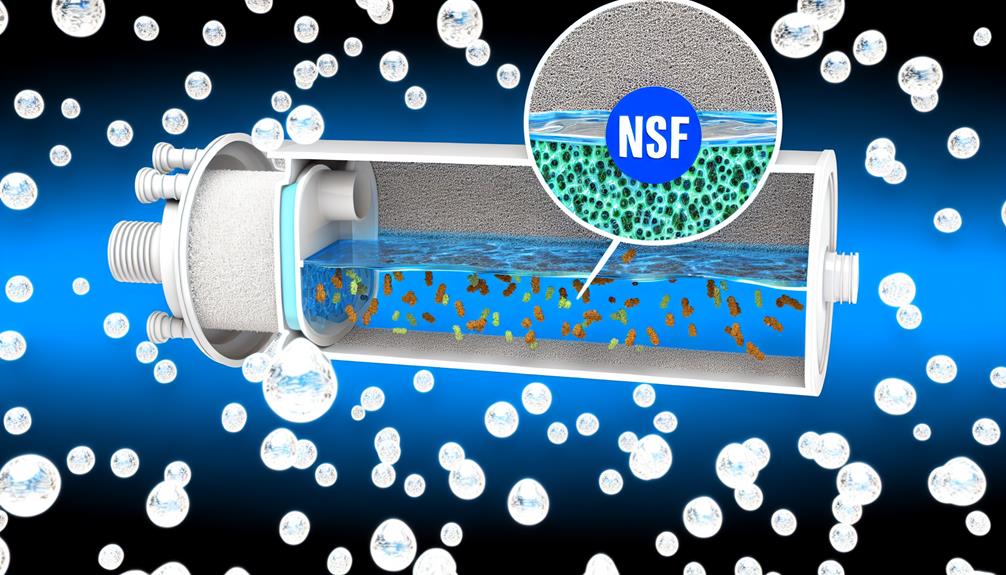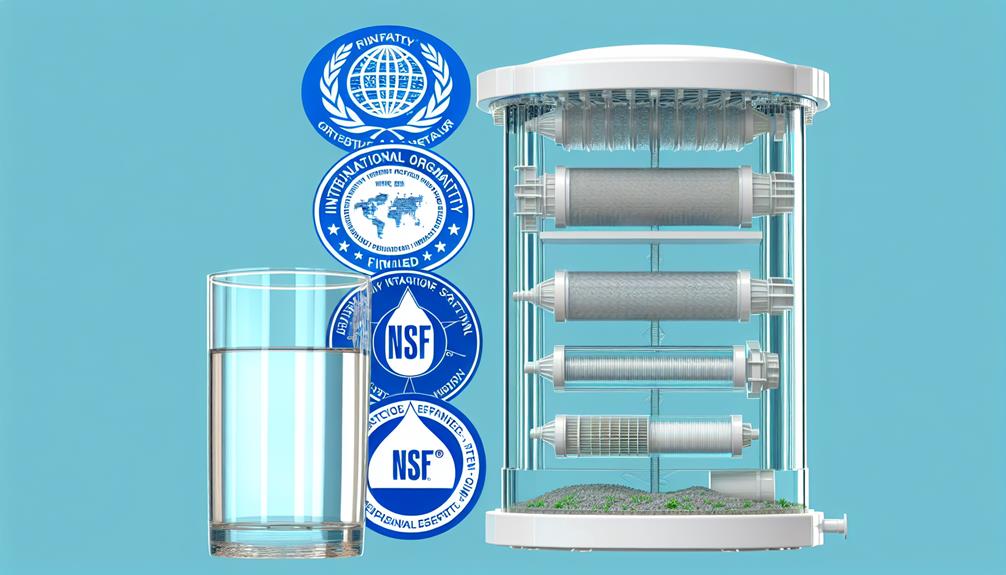Imagine a stream of clear, refreshing water pouring from your kitchen tap, free from the unseen contaminants that often lurk in our public water supplies. You're aware that this purity isn't accidental; it's the result of a meticulously designed water filter working silently under your sink.
As you fill your glass, you might wonder why it's crucial for that filter to have NSF certification. NSF International sets the benchmark for public health and safety, and a filter bearing its seal has been rigorously tested to ensure it does what it claims—protect you from various contaminants.
But the question remains: what does this certification process involve, and how does it affect the filter's performance and reliability over time? Stick around, and you'll discover the unseen layers of protection that NSF certification provides every time you turn on your tap.
Importance of NSF Certification
Understanding the significance of NSF certification is crucial, as it ensures that the water filters you rely on meet rigorous health and safety standards, effectively safeguarding your drinking water from contaminants. When a product is certified to NSF standards, it has undergone extensive testing and certification processes. This isn't just a cursory glance; NSF certification requires a detailed examination of the water treatment system's capabilities, specifically its filtration performance and the health effects of its contaminant reduction.
NSF/ANSI standards are comprehensive, covering various systems from reverse osmosis to UV treatment. They define what constitutes acceptable levels of aesthetic impurities and ensure that water softeners perform as advertised.
The integrity of NSF certification is maintained through ongoing evaluations and audits of manufacturing facilities, guaranteeing that certified water filters consistently meet public health and safety benchmarks.
Understanding NSF Standards
To ensure your water treatment system effectively removes contaminants, it's vital to grasp the specific protections afforded by each NSF standard, from particle filtration to pathogen reduction.
NSF certification acts as a guardian of public health and safety concerning drinking water. The NSF/ANSI 42 and 53 standards, for instance, target aesthetic and health-related impurities, utilizing adsorption and filtration techniques like those found in carbon filters to reduce harmful contaminants.
Delving deeper, NSF/ANSI 44 certified water softeners employ cation exchange resin, tackling the hardness due to calcium and magnesium ions. Meanwhile, NSF/ANSI 55 standard pertains to ultraviolet treatment systems, which deploy UV light to neutralize bacteria, viruses, and cysts. These are categorized into Class A and B, each designed for specific water conditions.
For the most rigorous contaminant reduction, NSF/ANSI 58 certified reverse osmosis systems use semi-permeable membranes and additional filters to intercept substances regulated by both Health Canada and the EPA.
You must analyze your water quality report or obtain independent testing, especially for private wells, to comprehend the contaminant profile. This critical step in the certification process helps inform the selection of a treatment system aligned with the relevant NSF standards to ensure the highest level of water purity and safety.
NSF Certified Vs. Compliant
When selecting a water filter, it's crucial to distinguish between products that are NSF certified and those merely compliant with NSF standards, as this difference impacts the reliability of the system's performance in contaminant reduction.
NSF certification means that an independent organization has rigorously tested the product to ensure it meets specific safety and performance standards for treating drinking water. This certification process includes regular on-site inspections of manufacturing facilities, a thorough evaluation of the materials used, and performance tests to verify that the product adheres to the claimed benefits.
On the other hand, a manufacturer might claim their product is 'NSF compliant' or 'meets NSF standards,' which suggests that they believe the product would pass the NSF certification process but it hasn't been independently verified by NSF through testing. This self-assessment doesn't carry the same weight as certification because it lacks the external validation that ensures the product performance claims are accurate and reliable.
You should look for the NSF mark on any water filter you consider. This mark signifies that the product has been certified by NSF and can be trusted to perform as advertised, contributing to the health and safety of your drinking water. Without this mark, there's no guarantee that the filter will perform as expected.
NSF Testing and Verification
As you consider various water filtration options, it's important to note that NSF testing and verification serve as a benchmark for the effectiveness and safety of these systems. When a product is NSF certified, it has undergone rigorous product testing against established NSF standards. This ensures that the water filter you're exploring isn't only certified to reduce specific contaminants but also meets material safety assessments.
NSF certifications, such as Standard 42 Certification, imply that a water filter has been evaluated for its capability to improve aesthetic qualities like taste and odor, typically associated with chlorine. Meanwhile, NSF/ANSI 53 Total PFAS certification indicates a filter's efficacy in reducing contaminants that have recognized health effects. NSF/ANSI 53, for example, covers a range of harmful elements, from heavy metals to organic compounds.
The NSF mark, often accompanied by numbers like NSF/ANSI 42 or NSF/ANSI 53, is a guarantee that the filter's claims have been independently testing and certified. It's a testament to the filter's ability to perform as advertised, ensuring you're making a well-informed decision.
Benefits of NSF-Certified Filters
Why should you opt for NSF-certified water filters? These certifications are more than mere badges of credibility; they assure you that the filter you're considering meets stringent health and safety standards, promising not just improved water taste and odor but also a significant reduction in harmful contaminants.
Here are key benefits of NSF-certified filters:
- Assurance of Performance: NSF standards for water filter certification are based on rigorous testing and certified products must demonstrate their capability to reduce harmful contaminants. This means that a Certified Water Filter is dependable for providing safe drinking water, adhering to established water treatment standards.
- Protection of Public Health: Filtration systems that are independently tested and certified by organizations like NSF play a critical role in safeguarding public health. They ensure that the water you drink is free of potentially hazardous substances, contributing to the overall wellness of your household.
- Compliance with Regulations: NSF-certified filters comply with the specific regulations set by bodies such as Health Canada and the EPA, offering you peace of mind that you're adhering to legal requirements for water quality.

